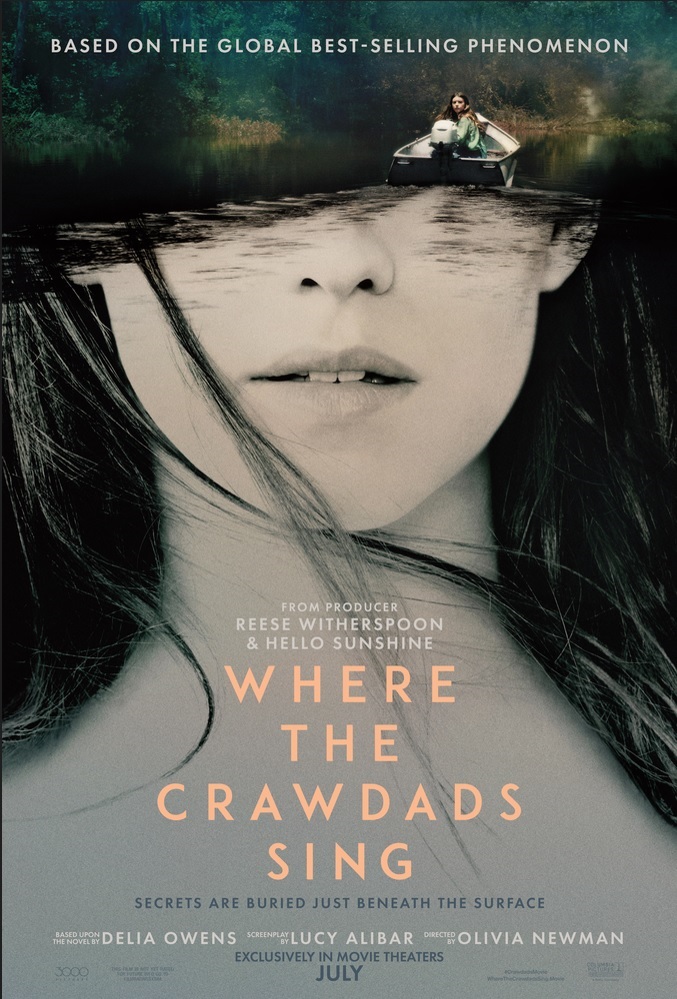Where the Crawdads Sing
The marshlands of North Carolina are practically a supporting character in Where the Crawdads Sing, an adaptation of Delia Owens's hugely successful novel. The film brings its setting vividly to life, and that strong sense of atmosphere serves to draw you in. Even if you can tell where the plot is headed long before it gets there - and I did - the movie is refreshing in the way it relies on the specificity of its locale. Do you remember where other recent movies took place? You'll remember this one.
Daisy Edgar-Jones (Fresh) plays Kya Clark, known to the residents of her small town as "the marsh girl." The first section of the story details how she got that nickname after hiding in the depths of the marsh to avoid the abusive father (Garrett Dillahunt) who drove away her mother and siblings. When he dies, she stays in their remote home, fending for herself despite not knowing how to read or write. Two local store owners, Jumpin' (Sterling Macer, Jr.) and Mabel (Michael Hyatt), keep watch over Kya as she grows from little girl to lonely teen. Her only other friend is Tate Walker (Taylor John Smith), a nice guy who sees past all the rumors about her. They eventually fall in love.
As a young adult, Kya is accused of murdering Chase Andrews (Harris Dickenson), a former star quarterback for the local football team with whom she becomes involved. She is defended in court by Tom Milton (David Strathairn), a kindly attorney who recognizes the jury likely already has biases against her because of her unusual, isolated lifestyle. Via flashbacks, we learn about her relationship with Tate, how she met Chase, and how she works to establish herself as an artist.
Where the Crawdads Sing is less about the trial than it is about Kya learning to become self-sufficient. Everyone important in her life abandons her at some point, leaving her both afraid to trust people and desperate for connection - two traits seemingly at odds with each other. Director Olivia Newman and writer Lucy Alibar dig into the psychological toll that takes, showing how her worldview is shaped by the tribulations she faces. Consequently, the outcome of the trial is rightly less important than the personal outcome. Not every aspect of the story is as fully developed as it probably is in the novel, and certain elements occur a bit abruptly. Watching Kya's journey unfold is never less than interesting, though, because she's such a uniquely troubled character. Everything she goes through increases our empathy for her.
Playing a character like this is tricky. Her simplicity could easily come off as either silly or contrived. Daisy Edgar-Jones avoids those traps, giving a heartfelt performance that focuses on Kya's humanity first and foremost. The actress imbues her with a practical nature, as though she understands life has dealt her an imperfect hand and she's determined to play it as best she can. Having such a compelling heroine generates momentum, even when you can feel the plot's machinations working too strenuously. Many of the best scenes are between she and Tom. Strathairn brings decency to the lawyer. He tries to raise Kya up when others want to tear her down.
Figuring out the murder mystery is fairly easy, but that's okay. Where the Crawdads Sing isn't about Kya's guilt or innocence so much as it's about her growth through the difficulties life throws at her. The ambitious themes could have been explored in a deeper, more substantive manner, rather than the occasionally surface-level way they are, yet they're still explored sufficiently to provide entertainment. Watching this character survive emotionally under these very specific challenges, and in this particular place, hooked me. She's compelling, and with Daisy Edgar-Jones and those alluring locations at the center, the movie is good escapist drama.
out of four
Where the Crawdads Sing is rated PG-13 for sexual content and some violence, including a sexual assault. The running time is 2 hours and 5 minutes.
